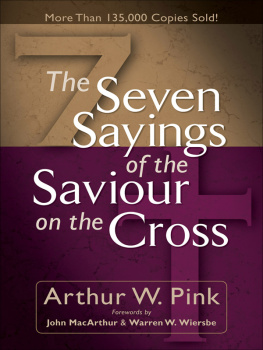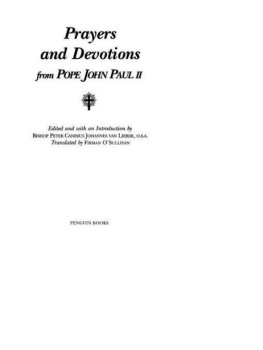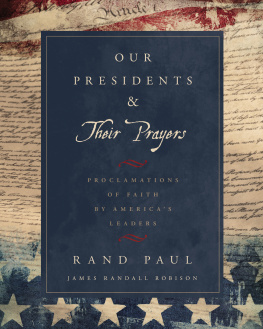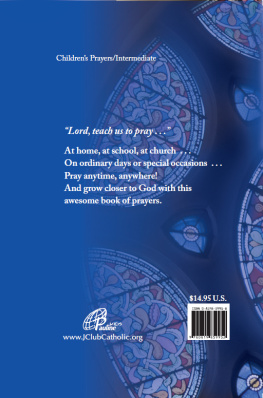Arthur W. Pink - Ability of God. Prayers of the Apostle Paul
Here you can read online Arthur W. Pink - Ability of God. Prayers of the Apostle Paul full text of the book (entire story) in english for free. Download pdf and epub, get meaning, cover and reviews about this ebook. year: 2012, publisher: Moody Publishers, genre: Religion. Description of the work, (preface) as well as reviews are available. Best literature library LitArk.com created for fans of good reading and offers a wide selection of genres:
Romance novel
Science fiction
Adventure
Detective
Science
History
Home and family
Prose
Art
Politics
Computer
Non-fiction
Religion
Business
Children
Humor
Choose a favorite category and find really read worthwhile books. Enjoy immersion in the world of imagination, feel the emotions of the characters or learn something new for yourself, make an fascinating discovery.

- Book:Ability of God. Prayers of the Apostle Paul
- Author:
- Publisher:Moody Publishers
- Genre:
- Year:2012
- Rating:3 / 5
- Favourites:Add to favourites
- Your mark:
- 60
- 1
- 2
- 3
- 4
- 5
Ability of God. Prayers of the Apostle Paul: summary, description and annotation
We offer to read an annotation, description, summary or preface (depends on what the author of the book "Ability of God. Prayers of the Apostle Paul" wrote himself). If you haven't found the necessary information about the book — write in the comments, we will try to find it.
Bible expositor Arthur Pink gives us a detailed look at the prayers of Paul showing us not only how to pray, but giving us greater insight into Paul himself, his relationship with God, and the people he served.
Ability of God. Prayers of the Apostle Paul — read online for free the complete book (whole text) full work
Below is the text of the book, divided by pages. System saving the place of the last page read, allows you to conveniently read the book "Ability of God. Prayers of the Apostle Paul" online for free, without having to search again every time where you left off. Put a bookmark, and you can go to the page where you finished reading at any time.
Font size:
Interval:
Bookmark:
The
A bility
of
G od
The
A bility
of
G od
A RTHUR W. P INK
M OODY P RESS
CHICAGO
1967, 2000 by
T HE M OODY B IBLE I NSTITUTE
OF C HICAGO
Original Title: Gleanings from Paul
All rights reserved. No part of this book may be reproduced in any form without permission in writing from the publisher, except in the case of brief quotations embodied in critical articles or reviews.
All Scripture quotations, unless indicated, are taken from the King JamesVersion.
Scripture quotations marked ( RV ), or stated to be from the Revised Version, are taken from The Holy Bible, The Revised Version, The Universities of Oxford and Cambridge, 1904.
Scripture quotations marked ( RSV ) are taken from the Revised Standard Version 1946, 1952, 1971 by the Division of Christian Education of the National Council of the Churches of Christ in the United States of America.
Scripture verses marked ( ASV ), or stated to be from the American Standard Version, are from The Holy Bible, containing the Old and New Testaments, an American recension of the (English) Revised Version; revised 188185; edited by the American Revision Commitee, 1901, Standard Edition. Copyright 1901 by Thomas Nelson & Sons; copyright 1929 by International Council of Religious Education.
ISBN: 0-8024-6573-0
1 3 5 7 9 10 8 6 4 2
Printed in the United States of America
P REFACE
TO THE
1967 E DITION
M en of the caliber of Arthur W. Pink appear on the religious horizon only rarely. His ability to apply the truths of Scripture to the lives of people, his vast and intimate knowledge of the Scriptures, and his clear-cut method of presenting the truths he experienced in his own life make his works not only vitally important for any serious Bible studentminister or laymanbut also admirably adaptable for individual devotional reading.
The contents of this volume first appeared in the periodical Studies in the Scriptures. They appear now for the first time in book form to continue their service to an increasingly widening circle.
The author is now forever with the Lord, having departed to be with Christ on July 15, 1952, at the age of sixty-six.
T HE P UBLISHERS
P REFACE
TO THE
2000 E DITION
I n the years since this volume was first published, styles and terminology have changed, but the truths presented in this volume have not. The prayers of the apostle Paul provide for the Christian in any age doctrinal studies and an example to follow in daily devotions before God. This volume is essentially unchanged from earlier editions, except that certain very long sentences have been shortened, some Scripture references have been added, and some terms have been replaced with modern. Several terms have been retained that are not commonly used today, but which have distinctive meanings Arthur Pink would have wanted carried forth in this edition. One is the term ineffable, which has the meaning of something not capable of being expressed; something indescribable. Pink uses the term to call to mind the inexpressible wonder of God. Two other terms are experimental and experimentally. Today those words bring to mind laboratory tests, but Pink had in mind personal knowledge as oppossed to derived knowledge. Alternate readings of a Scripture passage placed in the margin of the Bible by the translators are so indicated.
T HE P UBLISHERS
M uch has been written upon what is usually called The Lords Prayer, but which we prefer to term The Family Prayer, and much upon the high priestly prayer of Christ in John 17, but very little upon the prayers of the apostles. Personally we know of no book devoted to the same, and except for a booklet on the two prayers of Ephesians 1 and 3, we have seen scarcely anything thereon. It is not easy to explain this omission, for one would think the apostolic prayers had such importance and value for us that they would attract the attention of those who wrote on devotional subjects. While we very much deprecate the efforts of those who would have us believe the prayers of the Old Testament are obsolete and unfitted for the saints of this dispensation, yet it seems evident that the prayers recorded in the Epistles are peculiarly suited to Christians. Excepting only the prayers of the Redeemer, in the epistle prayers alone are the praises and petitions specifically addressed to the Father, in them alone are they offered in the name of the Mediator, and in them alone do we find the full breathings of the Spirit of adoption.
How blessed it is to hear some aged saint, who has long walked with God and enjoyed intimate communion with Him, pouring out his heart before Him in adoration and supplication. But how much more blessed should we esteem it could we have listened to the utterances of those who companied with Christ in person during the days when He tabernacled in this scene. And if one of the apostles were still here upon earth, what a high privilege we should deem it to hear him engage in prayer! Such a high privilege that most of us would be willing to go to considerable inconvenience and to travel a long distance in order to be thus favored. And if our desire were granted, how closely we would listen to his words, how diligently we would seek to treasure them up in our memories. Well, no such inconvenience, no such journey, is required. It has pleased the Holy Spirit to record quite a number of the apostolic prayers for our instruction and satisfaction. Do we evidence our appreciation of such a boon? Have we ever made a list of them and meditated upon their import?
In our preliminary task of surveying and tabulating the recorded prayers of the apostles, two things have impressed us, one at first quite surprising, the other to be expected. That which is apt to strike us as strangeto some of our readers it may be almost startlingis the book of Acts, which supplies us with most of the information we possess about the apostles, yet has not a single prayer of theirs in its twenty-eight chapters. Yet a little reflection should show us that this omission is in full accord with the special character of that book, for the book of Acts is much more historical than devotional, consisting far more of a chronicle of what the Spirit wrought through the apostles than of what He wrought in them. The public deeds of Christs ambassadors are there made prominent, rather than their private exercises. True, they are shown to be men of prayer, as is seen by We will give ourselves continually to prayer, and to the ministry of the word (6:4). Again and again we behold them engaged in this holy exercise (9:40; 10:9; 20:36; 21:5; 28:8); yet we are not told what they said, the nearest approach being 8:15, for their words are not recorded. We regard the prayer of 1:24 as that of the hundred and twenty, and that of 4:2430 as that of their own company (v. 23).
The second fact which impressed us while contemplating the field before us was that the great majority of the recorded prayers of the apostles issued from the heart of Paul; and this, as we have said, was really to be expected. You ask why? Several answers may be returned. Paul was preeminently the Apostle to the Gentiles. Peter, James, and John ministered principally to Jewish believers (Galatians 2:9), and even in their unconverted days they had been accustomed to bow the knee before the Lord. But the Gentiles had come out of heathenism, and it was fitting that their spiritual father should also be their devotional exemplar. Moreover, he wrote twice as many epistles as all the other apostles added together; nevertheless, there are eight times as many prayers in his epistles as in all of theirs. But chiefly we call to mind the first thing said of Paul after his conversion: Behold, he
Next pageFont size:
Interval:
Bookmark:
Similar books «Ability of God. Prayers of the Apostle Paul»
Look at similar books to Ability of God. Prayers of the Apostle Paul. We have selected literature similar in name and meaning in the hope of providing readers with more options to find new, interesting, not yet read works.
Discussion, reviews of the book Ability of God. Prayers of the Apostle Paul and just readers' own opinions. Leave your comments, write what you think about the work, its meaning or the main characters. Specify what exactly you liked and what you didn't like, and why you think so.












